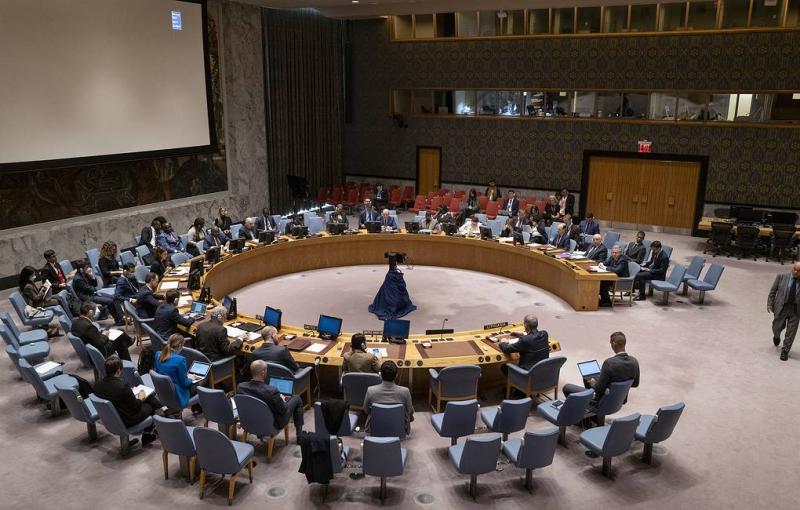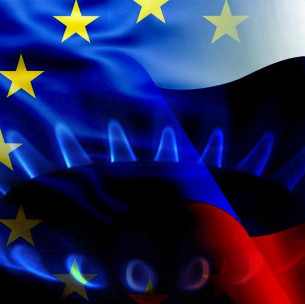
© AP Photo/Craig Ruttle/TASS
Top stories from the Russian press on Wednesday, December 28th, prepared by TASS
Ukraine's "peace summit" bid looks questionable, experts weigh in on Moscow's response to the West’s oil price cap, and a German MEP can see no peace in Europe without Russia. These stories dominated the headlines of Russian newspapers on Wednesday.
Kommersant: Ukraine’s proposal to convene peace summit at UN looks questionable
Ukraine is pursuing a "peace summit" at the United Nations by late February in which UN Secretary-General Antonio Guterres could act as a mediator. The UN chief has already given his consent, if all parties agreed to that. The problem is, Ukraine’s top diplomat Dmitry Kuleba warned that Russia could be invited only after it faces a tribunal for what he said were its war crimes. Therefore, the question of who Guterres should mediate between remains a mystery. For its part, Moscow finds holding such an event possible without Ukraine.
That being said, Kiev has been working toward Kuleba’s initiative. Ukrainian leader Vladimir Zelensky insists that the potential summit should be based on a 10-point "peace formula" he first introduced at the G20 summit in mid-November. Among other things, Russia should pull out its troops from what were his country’s borders in 1991, he demanded.
According to Andrey Kortunov, Director General of the Russian International Affairs Council, any conflict ends with a negotiating process and mutual concessions based on which some compromise is reached, if it is not about capitulation. While Zelensky has repeatedly reiterated his position on dialogue with Russia, "there is seemingly some flexibility in it" and it can be tweaked, he said, recalling the Istanbul talks when the sides differed, too. "They will hardly reach a comprehensive political settlement as part of a single document. The process should be divided into stages, it seems, and de-escalation should go first. Next, the conflict should be frozen, and a settlement should follow. There would be logic in such steps," the expert argued.
He believes the potential involvement of Guterres is no accident, since various people have claimed the role of mediators since the start of the conflict, but none of them have succeeded. "Apart from security issues around the Zaporozhye NPP and the role in the grain deal, neither the United Nations, nor its chief has played an active part in resolving the conflict. As far as I can judge from Guterres’ background and my little experience in communicating with him, he excels more in development issues than in security, and he has been much less involved in major crises and he is new in this domain," the expert maintained. "I guess, Zelensky realizes that there should be some talks with Moscow and that it won’t be possible to build a new system without Russia," he concluded.
Vedomosti: Experts weigh in on how Russia could counteract the West’s oil price cap
On Tuesday, Russian President Vladimir Putin signed off on measures retaliating against the price ceiling on Russian oil and petroleum products that the G7 and the EU imposed earlier. His framework document bans the exports of Russian crude and petroleum products to foreign entities and individuals, if there is direct or indirect reference to the use of the oil price cap in relevant contracts. The restrictions which could affect all delivery stages up to end consumers will come into effect on February 1 and will stay in force until July 1. Certain deliveries may circumvent the ban, provided the president authorizes those.
An official close to the government told Vedomosti that he saw almost no sense in the oil price ceiling with the existing EU embargo on crude exports in effect. Both seaborne and pipeline deliveries have been minimized already, while there is an exception for Hungary, Bulgaria, Slovakia, the Czech Republic and Croatia who continue receiving Russian oil. So, the main reason behind such a mechanism is to push the price of Russian fuel down for deliveries to neutral, primarily Asian, nations, he said.
"Even if neutral countries have a stronger position in negotiations on contracts for Russian oil, the potential for using such a lever is limited," the official insists. The market does need Russian oil, so if the discount of Russian blends to Brent expands at the first stage, it will gradually level off, he said.
Sergey Glandin, a partner with NSP law firm, believes two new blacklists can be drawn up in the wake of the Russian ruling. The first would be a list of countries, not necessarily unfriendly ones, and the other could comprise entities who have been seen buying Russian crude at or below the price ceiling. And if a Russian supplier ignores the presidential decree, there is no other prosecution mechanism but a criminal code article on the smuggling of raw materials anyway.
Attorney Yegor Filin believes the legal mechanism behind the implementation of the decree looks too complicated for the global oil market where it is sometimes hard to say who the end counterparty is. Filin also said the language of the decree was far from perfect as far as legalese goes, and that the document actually permits trade operations in oil with the listed nations.
Izvestia: German MEP sees no peace in Europe without Russia
In an interview with Izvestia, Gunnar Beck, a German member of the European Parliament, warned that while the gas price cap could call into question fuel imports to the European Union, the bloc has not exhausted its sanctions potential and may yet impose restrictions on nuclear cooperation with Russia or bring down its oil price ceiling.
Asked if the EU has made any progress on the potential confiscation of Russian assets, he said there is currently no legal basis for such a procedure and that the EU would hardly confiscate private Russian assets anyway.
While the United States has been the key supplier of weapons to Ukraine, and the West’s central pledge is based on US President Joe Biden’s commitment to send Patriot missiles, France has been reluctant to provide further military support, and any expansion of military assistance is being hotly debated in Germany, Beck said.
He refused to speculate on any security guarantees for Russia, until the EU agreed to engage with Moscow. However, he said, Europe would have to find a long-term peace solution as soon as there is a peace agreement or a ceasefire in Ukraine. Beck took for granted French President Emmanuel Macron’s call to take heed of Russia’s interests in security and expressed his hope that this idea would one day prevail in Germany, too.
"Let’s face it, Europe is facing a major economic crisis. Governments have been trying to appease the population by going on a borrowing spree, but this cannot go on indefinitely," he told Izvestia. "As the [military conflict] rages on, exhaustion will follow, and [people] will return to reality. It is impossible to achieve a universal peace in Europe without taking Russia’s interests into account. It is Europe’s largest military power," he concluded.
RBC: Putin aide upbeat on Russian economy in 2023
Today, there is every reason to believe that Russia could see a much faster economic growth next year, presidential aide Maxim Oreshkin told RBC. In 2022, he said, Russia accumulated a huge money supply that has not yet trickled into the economy.
"So far, the money supply has grown by some 13 trillion rubles ($184 billion), or 20%, with companies accounting for the bulk of the increase. Since early this year, ruble balances on Russian companies’ accounts have surged by 8 trillion rubles ($113 billion), or 34%. This is a huge amount that has so far remained outside the economy," Oreshkin noted.
The ruble funds Russian companies have accumulated will gradually penetrate into the economy through wage growth, investments and the replenishment of stocks, he argued. However, the official warned that the positive trend would be "timid and vulnerable" and would hardly outweigh volatility in the economy.
"Naturally, there will be minor drawdowns and the trend will remain volatile, but all these fundamental factors indicate that there will be a good positive impact on the economy early next year," Oreshkin forecasted.
Vedomosti: Syria opens its skies to Russian civilian aircraft
Authorities in the Syrian Arab Republic have allowed Russian civilian airlines to fly through the country’s airspace, head of the Syrian Civil Aviation Authority, Basem Mansour, announced on Tuesday. He added that Damascus had requested flight schedules from Moscow to open air corridors to Russian planes and was still expecting a reply. Syria is capable of ensuring the safety of flights, Mansour assured.
However, the situation in Syria remains tense amid its armed confrontation with Israel, a Russian Aviation official said, thus, any possibility of operating Russian civilian flights above Syria will require a thorough evaluation, he argued.
Moscow needs guarantees from Syria’s competent authorities, while the Russian aviation watchdog has not received any through diplomatic channels yet, he said.
Oleg Panteleyev, who heads the Aviaport aviation think-tank, doubts Russian aviation officials will authorize flights in Syrian skies as long as Israeli airstrikes on Syrian territory continue. The only way out is to make every diplomatic effort to convince Jordan of the reliability and comprehensive nature of coverage by Russian insurers, the expert believes.









